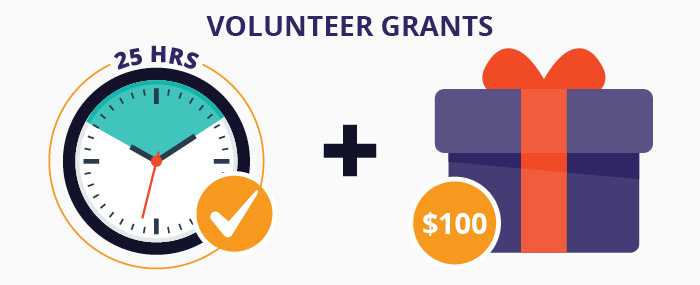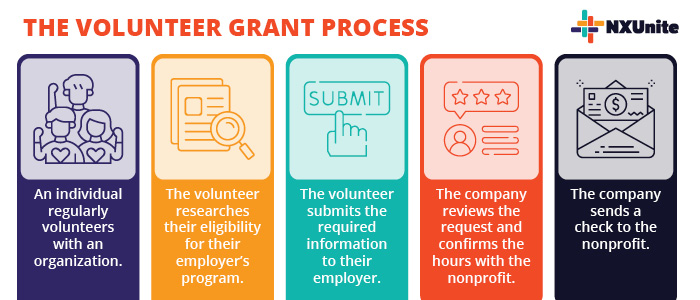Volunteer Grants – Nonprofit Catalog
If you have a devoted volunteer base but haven’t heard of volunteer grants, you’re missing out on easy revenue! Corporate volunteer grants are an excellent way to supercharge your volunteer relationships, kickstart new corporate partnerships, and enhance your fundraising strategy.
Tapping into this resource is pretty simple when you know the basics. To help you get started, we’ll cover the essential components of these programs and provide some practical tips along the way. In no time, you’ll cultivate a lucrative volunteer grant strategy that helps you pursue your mission.
What Are Volunteer Grants?
Corporate volunteer grant programs are a type of corporate philanthropy in which companies make monetary contributions to nonprofits where their employees regularly volunteer. Some businesses pay per volunteer hour while others require employees to serve a minimum number of hours with an organization. Then, after a volunteer submits a grant request, the company will send a check to the nonprofit.
So, let’s say a company offers $100 for every 25 hours an employee serves a nonprofit. Once a devoted supporter volunteers those 25 hours, they can submit a request to their employer who will then send the donation.

Some companies also offer team volunteer grants as a way to encourage team-building and volunteerism in the communities where employees live and work. Crowd101’s corporate giving statistics page shows that 82% of companies report that their employees want to volunteer with their peers, making team volunteer grants a powerful engagement opportunity. When a business offers team grants, they often have additional requirements such as how many employees must volunteer together.
Benefits of Corporate Volunteer Grants
Volunteer grants are impactful programs because they benefit nonprofits, companies, and volunteers alike. Whether you’re making a case to your board of directors to pursue this opportunity or convincing a local business to launch a program, here are some key benefits you can share:
For Nonprofits
Through corporate social responsibility (CSR) initiatives like volunteer grants, nonprofits can:
- Access more critical funding. Volunteer grants allow you to generate more revenue from supporters without having to solicit them for gifts. Your volunteers have already committed their time to your nonprofit. To earn more essential funds for your mission, all they need to do is check their eligibility and submit their hours to their employers.
- Recruit and retain more volunteers. Knowing that their employers will amplify the impact of their support can inspire more people to dedicate their time and skills to your cause. Since 66% of volunteers indicate that making a difference in their community is their primary motivation for getting involved, the prospect of making an even greater difference can turn them into regular volunteers for your nonprofit.
- Secure more donations. According to the Global Trends in Giving Report, 66% of donors volunteer around the world, with 73% donating to the nonprofits they volunteer with. Your volunteers have already demonstrated an investment in your cause. By retaining their support over time, you’ll increase the chances of converting them into donors as well.
- Build more long-term partnerships with companies. If many of your volunteers work for the same company that offers volunteer grants, you might reach out and establish a mutually beneficial partnership with the company. This can pave the way for event sponsorships, collaborative cause marketing campaigns, and more.
Your nonprofit can obtain more volunteer grants by sharing these benefits, alongside basic instructions about the process, across multiple communication channels. By ensuring that supporters are aware of this impactful opportunity and practicing consistent volunteer appreciation, you’ll be able to unlock more funding over time.
For Companies
Corporate philanthropy has become a major priority among businesses around the world. By providing volunteer grant opportunities to employees, companies can:
- Increase employee engagement. Many employees need more than a regular paycheck to feel invested in their roles. Nonprofits Source’s employee engagement guide lists CSR programs as a key way to increase employee loyalty and productivity. By giving them the chance to support causes they care about, companies can provide employees with a sense of purpose and fulfillment in the workplace.
- Recruit more top talent. Beyond competitive pay and employee benefits, CSR initiatives like volunteer grants can help companies stand out to talented job seekers. In fact, three out of four U.S. employees indicate that they want to work for a company that makes a positive impact on the world.
- Boost their reputation. In today’s competitive business landscape, companies must do more than just make profits to be successful. To win the hearts of people in their communities, they must contribute to the well-being of society as a whole. Volunteer grants are one effective way for them to demonstrate this commitment to social good.
- Attract more customers. Launching a volunteer grant program can enhance a company’s success and sustainability by bringing in new, socially conscious shoppers and turning them into loyal customers. After all, 77% of consumers want to purchase from companies with CSR initiatives.
By joining forces, nonprofits and companies can accomplish more of their goals, expend fewer resources, and leave a lasting impact on the world.
For Volunteers
By devoting their time to nonprofits and securing volunteer grants from their employers, volunteers can:
- Generate more of an impact. Your nonprofit’s supporters have different preferences and capacities when it comes to getting involved in your cause. Volunteer grants empower them to make financial gifts to your nonprofit without having to spend their own money.
- Achieve more personal fulfillment. Volunteering is an excellent way for people to find a sense of belonging and purpose in their lives. Considering that the current estimated value of each volunteer hour is $31.80, volunteer grants allow your supporters to amplify the impact of their contributions even more.
- Tap into the benefits of volunteering. Your volunteers are busy people. Between their careers, hobbies, and personal commitments, it might be difficult to find time to volunteer. Volunteer grants can provide an added incentive to inspire more of your supporters to volunteer and experience all the benefits that come with it—from reducing stress to developing essential skills.
With more involved volunteers, your nonprofit will be well on its way to cultivating a strong, tight-knit community of supporters around your cause.
Common Guidelines for Volunteer Grant Programs
When laying out their volunteer grant programs, businesses typically set a few ground rules for participation. Your volunteer coordinator should be aware of the different types of requirements that companies commonly implement, such as:
- Employee eligibility: This refers to an individual’s employment status at the company. For example, a company might offer volunteer grants for full-time, part-time, and retired employees.
- Nonprofit restrictions: Some corporations will place restrictions on which types of nonprofits are eligible. In most cases, companies state that any 501(c)(3) nonprofit or educational institution is eligible.
- Submission deadlines: Volunteers must typically submit a request by a certain date. Standard deadlines include the end of the calendar year or a set number of months after the individual volunteered.
- Required hours: While most companies have a minimum hour requirement for eligibility, some pay by the hour.
- Donation amount: This is the total grant amount that a company will donate to a nonprofit after the hours are completed. Guidelines may also include how many grants the company offers per employee each year.
- Logging hours: Companies have different hour reporting requirements. They may require employees to fill out printed or electronic forms.
Corporate giving software can give you instant access to information on thousands of volunteer grant programs. You can embed a search tool where volunteers can research their companies, determine their eligibility, learn how to log their hours, and gain access to required forms.
How to Win A Volunteer Grant
With help from a corporate giving database, a volunteer can request a volunteer grant from their employer within minutes. Double the Donation’s corporate volunteer grant guide breaks it down into five easy steps. Here’s how it works:

- An individual volunteers with a nonprofit on a regular basis.
- The volunteer researches their eligibility for their employer’s program using a corporate giving database.
- If eligible, the volunteer fills out the required forms, either electronically or using a paper form.
- The company reviews the grant application and reaches out to the nonprofit to confirm the submitted information.
- If everything is in order, the company sends a check to the nonprofit.
It’s that simple! When it’s all said and done, make sure to reach out to thank your volunteers for all their hard work. Show that you appreciate them going above and beyond by submitting volunteer grant applications even after donating their time to your organization. By the end of it, you’ll drive greater volunteer satisfaction and inspire them to stick around for years to come.
Additional Resources
Nonprofit Catalog – Read up on more nonprofit essentials by exploring our Nonprofit Catalog.
The Ultimate Guide to Workplace Giving Platforms (+ Trends!) – Corporate giving goes beyond volunteer grant programs. Learn about other workplace giving initiatives and how software can make it easy to leverage these opportunities.
Nonprofit Fundraising Training: FAQs and 8 Top Resources – Is your team prepared to take advantage of fundraising opportunities like volunteer grants? Here are some training resources to help them develop their fundraising skills.


